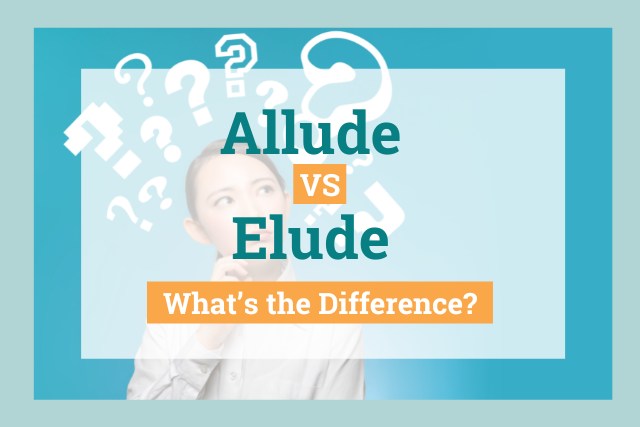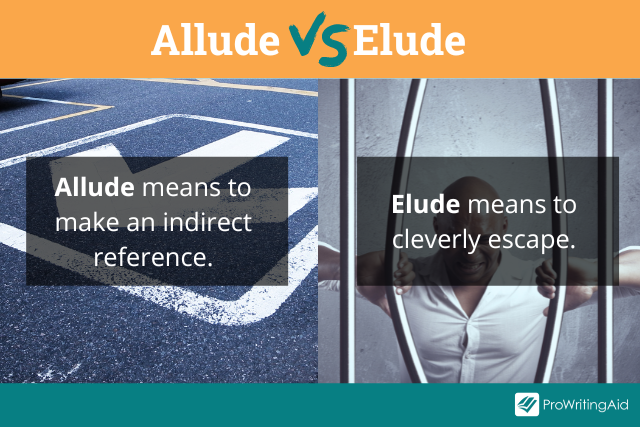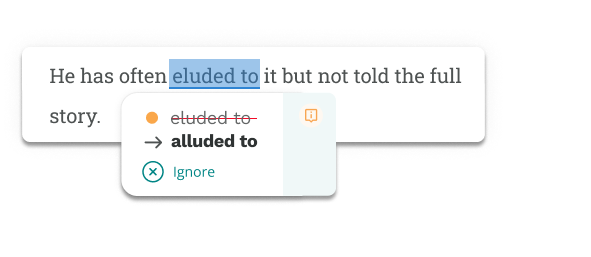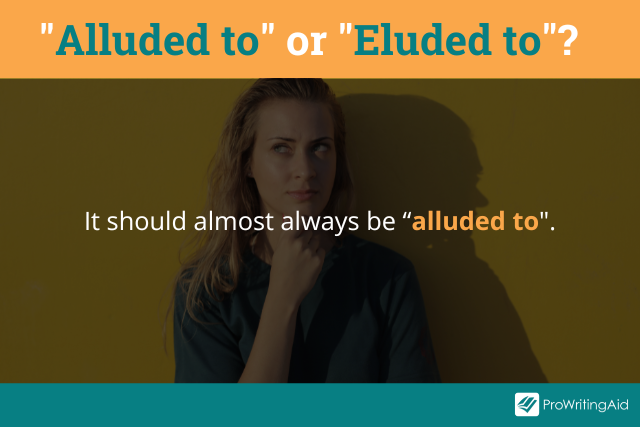
Many writers mix up the words allude and elude because they sound so similar.
However, these two words have very different meanings. Learning how to use these commonly confused words will make you a better writer.
This article will explain the differences between allude and elude, and help you make sure you’re using the right word in your writing.
Definition of Allude vs. Elude
Allude means “to make an indirect reference,” while elude means “to cleverly escape.”

Why do these two words sound so similar? Both allude and elude are verbs that stem from the Latin ludere, meaning “to play.” After all, both words describe an action that’s somewhat playful and crafty.
When to Use Allude
You should use allude to describe the act of hinting indirectly at something.
For example, you could say, “The politician alluded to his past mistakes without really acknowledging them.”
If someone references something directly, you should use the word quote or mention instead. Allude only applies if the reference is indirect.
When to Use Elude
You should use elude to describe the act of evading or escaping a pursuer in a clever way.
For example, you could say, “The thief eluded the police.” This means that the thief cleverly avoided getting caught.
“Sleep eluded me” is a common English expression that means the speaker couldn’t fall asleep no matter how hard they tried.
One helpful tip when you’re trying to figure out which word to use is that you often use the preposition to after allude, but rarely after elude. If you’re wondering whether to say “alluded to” or “eluded to,” it is likely the former.
ProWritingAid’s grammar checker can help you detect incorrect usage if you’re not sure you’re using the right word.

Alluded vs. Eluded Examples
Let’s look at some examples of alluded and eluded in a sentence.
“My hard work was expected rather than exceptional. It’s not that my dad ever told me or even alluded to the fact that I was a failure, but my actions no longer got his unprompted attention or praise, so I constantly felt that I wasn’t doing enough.”—Lily Collins, Unfiltered
“Some of it might have been the fabled geographic cure, to which I believe I have already alluded. It’s a wholly illogical but nonetheless powerful belief that things will change for the better in a new place; that the urge to self-destruct will magically disappear.”—Stephen King, Wolves of the Calla

“Gatsby believed in the green light, the orgastic future that year by year recedes before us. It eluded us then, but that's no matter—tomorrow we will run faster, stretch out our arms farther…”—F.Scott Fitzgerald, The Great Gatsby
“You are your own worst enemy. If you can learn to stop expecting impossible perfection, in yourself and others, you may find the happiness that has always eluded you.”—Lisa Kleypas, Love in the Afternoon
Alluding vs. Eluding Examples
“As I’ve been alluding to, my one saving grace is distraction. It keeps me sane. It helps me cope, considering the length of time I’ve been performing this job.”—Markus Zusak, The Book Thief
“The name of the city of Nashik near Panchavati is derived from ‘nasika’ which means nose in Sanskrit and Prakrit, alluding to the cut nose of Surpanakha.”—Devdutt Pattanaik, Sita
“For if there is a sin against life, it consists perhaps not so much in despairing of life as in hoping for another life and in eluding the implacable grandeur of this life.”—Albert Camus, Summer in Algiers
“Everything I’d been taught about eluding someone came rushing back to my head. What I wanted to do more than anything was look around and see if I had a follower, but that would have definitely attracted attention.”—Richelle Mead, Last Sacrifice
Now you know the difference between allude and elude.
What other commonly confused words do you tend to get mixed up? Let us know in the comments.


